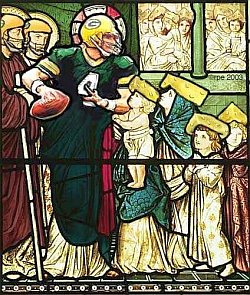Now the day began to wear away, and the twelve came and said to him, “Send the crowd away to go into the surrounding villages and countryside to find lodging and get provisions, for we are here in a desolate place.” But he said to them, “You give them something to eat.” They said, “We have no more than five loaves and two fish–unless we are to go and buy food for all these people.” For there were about five thousand men. And he said to his disciples, “Have them sit down in groups of about fifty each.” And they did so, and had them all sit down. And taking the five loaves and the two fish, he looked up to heaven and said a blessing over them. Then he broke the loaves and gave them to the disciples to set before the crowd. And they all ate and were satisfied. And what was left over was picked up, twelve baskets of broken pieces.
—Luke 9:12-17
I’ve probably heard more sermons on the feeding of the 5,000 than just about any other miracle in the Bible. That said, I don’t think I’ve ever heard a sermon on the aspect of it I’m going to write about today.
Some people will contend that I’m critical of the Church. Fact is, I love the Church. I want to see the Church be all she can be, because I know that when she walks in the fullness of her beauty, she takes on the transcendence of her Lover and the world around her transforms.
Which is why I am so crestfallen when I hear Christian people tell me how they are suffering in the midst of the plenty that is their own local church.  I hear from people with basic needs that any person in the church could meet with a modicum of effort, yet that need goes unfulfilled.
I hear from people with basic needs that any person in the church could meet with a modicum of effort, yet that need goes unfulfilled.
Honestly, I can think of few things more crushing to the spiritual life of another than to sit in church on Sunday and hear a sermon on God’s bounty, surrounded by people who are abounding, but not being one of them.
Increasingly, there exists a Christian rhetoric that states, I don’t have to do anything to help you because God will help you on His own, if someone prays hard enough. The problem is that the more I read the Scriptures, the more I’m convinced that mentality is the exact opposite of what God is trying to tell us about the way He works.
In the feeding of the 5,000 in Luke, Jesus makes—what is to me, at least—one of the most startling statements in the New Testament. The disciples, sensitive to the growing need of the crowd for food, alert Jesus to the problem, but He responds that the disciples should feed them. Almost instantly, the excuses start.
How the rest of the miracle unfolds is also telling. It happened while the disciples finally did the work that Jesus requested. As they handed out the food from the baskets, the miracle progressed. It didn’t happen before the work. In other words, Jesus didn’t make extra baskets of food materialize at His feet before the dazzled onlookers. Only as the disciples walked from person to person handing out food did the true nature of the miracle unfold. Jesus asked them to feed the crowd, and they did.
We gloss over that the disciples were active participants in the work of meeting the needs of others. The disciples were partners in the miracle.
Paul writes:
How then will they call on him in whom they have not believed? And how are they to believe in him of whom they have never heard? And how are they to hear without someone preaching? And how are they to preach unless they are sent? As it is written, “How beautiful are the feet of those who preach the good news!”
—Romans 10:14-15
In short, the Lord wants the Gospel to go out, and it goes out because a real person delivers it. No one will hear unless a flesh and blood human does the work.
Paul also writes this:
Therefore, we are ambassadors for Christ, God making his appeal through us.
—2 Corinthians 5:20a
The king empowers an ambassador to be his full representative. An ambassador can make decisions and perform actions as if the king himself were making or performing them. The king’s decree and charge make that power possible.
This comes by the Holy Spirit living in us. A couple verses before, Paul wrote this:
Therefore, if anyone is in Christ, he is a new creation. The old has passed away; behold, the new has come. All this is from God, who through Christ reconciled us to himself and gave us the ministry of reconciliation; that is, in Christ God was reconciling the world to himself, not counting their trespasses against them, and entrusting to us the message of reconciliation.
—2 Corinthians 5:17-19
Note well that final phrase.
Paul also writes:
And we all, with unveiled face, beholding the glory of the Lord, are being transformed into the same image from one degree of glory to another. For this comes from the Lord who is the Spirit.
—2 Corinthians 3:18
The new birth and our transformation into Christ’s fullness make it possible for us to be ambassadors.
2 Corinthians 5 concludes with this amazing statement:
For our sake he made him to be sin who knew no sin, so that in him we might become the righteousness of God.
—2 Corinthians 5:21
Christian, you are the righteousness of God! Wherever you go, you are His salt, His light, His full representative, His very image.
All Scripture is breathed out by God and profitable for teaching, for reproof, for correction, and for training in righteousness, that the man of God may be competent, equipped for every good work.
—2 Timothy 3:16-17
…for it is God who works in you, both to will and to work for his good pleasure.
—Philippians 2:13
For we are his workmanship, created in Christ Jesus for good works, which God prepared beforehand, that we should walk in them.
—Ephesians 2:10
Are we walking in those good works that God prepared beforehand? Are we seeing the need and filling it because God has equipped us to meet needs because He Himself lives in us? Or are we reading the Bible just to fill our heads with more knowledge about work we aren’t doing?
This passage is telling:
And a man lame from birth was being carried, whom they laid daily at the gate of the temple that is called the Beautiful Gate to ask alms of those entering the temple. Seeing Peter and John about to go into the temple, he asked to receive alms. And Peter directed his gaze at him, as did John, and said, “Look at us.” And he fixed his attention on them, expecting to receive something from them. But Peter said, “I have no silver and gold, but what I do have I give to you. In the name of Jesus Christ of Nazareth, rise up and walk!” And he took him by the right hand and raised him up, and immediately his feet and ankles were made strong. And leaping up he stood and began to walk, and entered the temple with them, walking and leaping and praising God.
—Acts 3:2-8
What is notably absent from that healing and the way Peter and John worked? I’ll let you think about that for a while.
God intends for us Spirit-filled believers to do the work. We’re already equipped. We’re already charged.
But Dan, what about these?
I am the vine; you are the branches. Whoever abides in me and I in him, he it is that bears much fruit, for apart from me you can do nothing.
—John 15:5
But he said, “What is impossible with men is possible with God.”
—Luke 18:27
Folks, these two verses are the poster children for misapplying Scripture and for making excuses for dumping all the responsibility back on God to make anything happen.
The truth is that God lives in you. He is always in you. Where you go, He is. You are the righteousness of God. Anything is possible because God is working through you.
There is NEVER a reason for a fellow believer to be in want. NEVER. If a local church contains people with plenty and people in want, there’s only one word for that church: Ichabod. The glory has departed.
This issue makes me angry. It makes me furious when the Church has been equipped, approved, and charged with the task by God, yet the people in the Church won’t do the work. They throw it back in God’s lap and ask Him to do the work for them instead. As I see it, that’s a complete dismissal of our identity in Christ and a rejection of the Holy Spirit in us.
How ironic that we abort our responsibility when confronted with people in need, yet what follows are the first things the newly Spirit-filled Church did:
And they devoted themselves to the apostles’ teaching and the fellowship, to the breaking of bread and the prayers. And awe came upon every soul, and many wonders and signs were being done through the apostles. And all who believed were together and had all things in common. And they were selling their possessions and belongings and distributing the proceeds to all, as any had need.
—Acts 2:42-45
If God puts someone with a legitimate need before me, there’s nothing for me to pray about. I already know what to do. I’m to do the work and meet the need as best I can in light of all that Christ has given to me and done for me. And if the need is too great, then I pull the rest of the Church in and we meet the need. When we do the work because we have the faith and the equipping for it, then the miracle will progress through us because of what Christ has already done in us.
If we learn no other truth this year, that one will be enough.
 Over at Al Mohler’s site, he adds to the talking point that sports, notably the Super Bowl, are the new American religion. Over at Amazon.com, several “unhelpful” review comments for my negative review of the Christian book Transformed got me wondering about doing versus being.
Over at Al Mohler’s site, he adds to the talking point that sports, notably the Super Bowl, are the new American religion. Over at Amazon.com, several “unhelpful” review comments for my negative review of the Christian book Transformed got me wondering about doing versus being.

 I’m very sympathetic. I don’t like the government taking my money and giving it to someone else, either.
I’m very sympathetic. I don’t like the government taking my money and giving it to someone else, either.